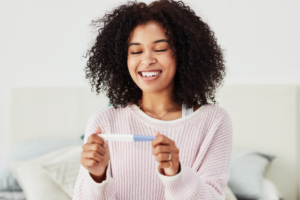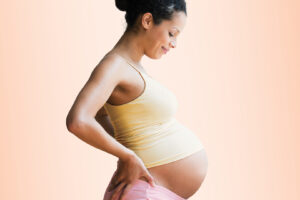For years women didn’t talk much about the changes they experienced before, during and after menopause. It’s just in the last 30 years or so that women have been encouraged to speak with their physicians about their symptoms.
Now, women are much more in tune with their bodies and proactive about seeking treatment for the symptoms that can make life uncomfortable. Below, I’ll share some lesser-known facts about “the change of life.”
Menopause is diagnosed after it’s over
Clinically speaking, menopause is when a woman goes 12 months without a menstrual period. It’s called a retrospective diagnosis because you don’t know you’re going through it until you look back. And, when you look back and realize that it’s been 12 months, you’re actually post-menopausal!
The pre-cursor to menopause is peri-menopause
Before you experience the 12-month period pause, you’ll probably go through peri-menopause, which is marked by skipping periods, heavier or lighter periods, or prolonged bleeding during your period.
Menopause is more than just hot flashes
In addition to hot flashes, you also may experience:
- Sleeplessness
- Vaginal dryness
- Mood changes
- Urinary incontinence
- Frequent urinary tract infections
- Loss of concentration and a feeling of mental cloudiness
Hot flashes can affect your focus
Up to 70 percent of women will experience hot flashes, and they can occur during the first six months to two years after menopause and up to 10 years or more afterward. Clinicians with the North American Menopause Society recently researched why many women report feeling mentally “foggy” while going through the change. They found that patients who have multiple hot flashes – five to six an hour – have such an increase in blood flow to the skin that it can temporarily reduce blood flow to the brain. This reduced blood flow can affect your brain’s ability to function and kill your concentration.
Menopause can start as early as 40 years of age
Yep, you read that right; menopause can occur any time after the age of 40. While it’s rare—fewer than 200,000 cases are diagnosed each year – early menopause is called ovarian insufficiency, meaning your ovaries aren’t producing normal amounts of the hormone estrogen or releasing eggs regularly. The symptoms of early menopause include irregular periods, hot flashes, irritability, and infertility.
Menopause can start as late as your early 60s
Most women experience menopause after age 40, usually at age 51 or 52, but it can hold off until a woman reaches her early 60s. Again, it’s rare but not impossible.
There are several treatments for hot flashes, not just hormone therapy
Hot flashes can occur occasionally or up to several times an hour every day. They can be treated through hormone replacement therapy, but there are several other treatments, including:
- Deep breathing exercises conducted at the time of the hot flash
- Medications that treat depression, such as paroxetine, lexopril and gabapentin
- Lifestyle changes, such as avoiding alcohol, caffeine and tobacco
- Keeping the room cool
- Wearing layers and cooler, light-colored clothing
- Drinking cool beverages
- Exercising, particularly yoga or meditation, which can lower blood pressure
- Using a cool-touch pillow or “chillow”
- Maintaining a healthy weight
There’s no correlation between when your period starts and when you start menopause
When you begin menopause can depend on a number of factors, such as having a medical condition like hypothyroidism or an autoimmune disease; undergoing radiation treatment for cancer; or having a hysterectomy. For most women, there isn’t a clear-cut reason for the timing of menopause.
The amount of calcium in your bones is set at age 30
Estrogen is a big factor in how you metabolize calcium and absorb it into your bones, so once your body’s production of estrogen starts to slow around age 35, you start to loss bone mass. Whatever calcium is stored in bones at age 30 is what you’ll have for the rest of your life, so you need to supplement your calcium intake so your body doesn’t borrow it from your bones. To do this, eat a diet rich in calcium and vitamin D and perform weight-bearing exercises.
Sources of calcium include the usual sources, like milk, cheese and yogurt, as well as:
- Spinach
- Kale
- Collard greens
- Okra
- Soybeans
- White beans
- Salmon
- Rainbow trout
Foods that provide vitamin D include:
- Fortified foods like dairy products, orange juice, soy milk and cereals
- Tuna
- Salmon
- Cheese
- Egg yolks
- Beef liver
Not all women need both estrogen and progesterone after menopause
For many women, hormone therapy can help lessen the symptoms of menopause and greatly improve quality of life. It replaces the hormones estrogen that your body is no longer producing. For women who haven’t had a hysterectomy, your doctor may recommend taking estrogen and progesterone together to keep the lining of the uterus thin and reduce your risk of developing uterine cancer. The dosage prescribed is just enough to replace what you need to protect the uterus and curtail hot flashes. Women who have had hysterectomies don’t need to take progesterone. This is good news, since just taking estrogen alone means fewer long-term health risks.
There are several options to relieve vaginal dryness
When your body stops producing estrogen, one side effect is vaginal dryness, which can make intercourse uncomfortable. Estrogen therapy can help. If you have other menopausal symptoms, your doctor may recommend oral hormone replacement. However, if your only symptom is dryness, a topical, low-dose estrogen treatment may be more appropriate. Topical estrogen comes in several forms: cream, tablet or vaginal ring. Your doctor should prescribe the lowest dose of estrogen needed to relieve dryness. Vaginal moisturizers also can be used, as well as some newer, non-hormonal FDA-approved therapies. The FDA-cleared fractional CO2 laser has been a promising new non-medication treatment as well.
A recent patient had been suffering from vaginal dryness – and painful intercourse – for nearly three years before she booked an appointment with me for guidance. Her previous ob/gyn hadn’t asked about vaginal dryness during her well-woman visit and she was embarrassed to bring it up herself. We had a frank discussion about her symptoms and after an examination, I prescribed a topical vaginal treatment. Her symptoms improved significantly at her two-month follow up visit and continued so she was able to be intimate with her partner again.
The most important advice I can give women is that there are a variety of effective treatments to manage the symptoms of menopause. There is no reason to suffer. Talk to your doctor about your options.
 Helen Simigiannis, MD, FACOG, is a board-certified obstetrician/gynecologist on staff at CentraState Medical Center. She is also a North American Menopause Society Certified Menopause Practitioner, and has a private practice in East Windsor. She can be reached by calling 866-CENTRA7.
Helen Simigiannis, MD, FACOG, is a board-certified obstetrician/gynecologist on staff at CentraState Medical Center. She is also a North American Menopause Society Certified Menopause Practitioner, and has a private practice in East Windsor. She can be reached by calling 866-CENTRA7.





